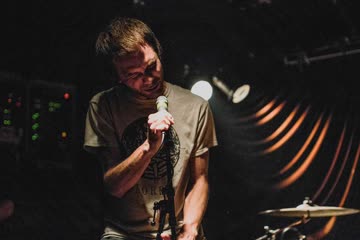Why Jeremy Neale's Debut Solo Album Made Him Evaluate His Entire Life
"‘Okay, how am I going to rebuild the foundations of a life that works for me?’"

“I think a lot of this record was me figuring out a way to make my life work when it wasn’t really working,” Jeremy Neale begins, cutting straight to the chase on his highly anticipated debut album, Getting The Team Back Together.
It’s a tone reflected throughout the LP’s 11 songs, and something Neale has mastered across a number of EPs and his time fronting Brisbane band Velociraptor. “That was the prime focus; getting the word right,” he tells. “Sometimes there’s a discrepancy between how you’ve been feeling and how you can word it, but over time I’ve gotten better at being super-honest about my experiences and then wording it in a way that’s not hidden - it’s straight-up.”
While on previous releases the affable singer-songwriter took a more “derivative” approach to music (not in a negative way), he let the aforementioned method of penning lyrics drive this album’s sound. “I’m heading towards a new or more consistent sound,” he says, which is confirmed through the record’s ebbs and flows, assisted by producer Miro Mackie, who maintained a birds-eye view of the project throughout. “I have stuff I want to say and I was like, ‘I’ll say it in my voice and I’ll figure out what the common ground is there, and apply the production to suit’.”
Getting The Team Back Together is an eclectic take on late-‘70s/early-‘80s power pop and on first inspection will grab you with insanely catchy hooks (Small Talk, Video), but after multiple spins its depth is revealed and presents an artist who has truly found his groove, largely through an interesting contrast between fun melodies and relatable, thought-provoking lyrics. “I wasn’t having a great time and I wasn’t looking after myself as well as I should have. A lot of it was written in a period of my life where I was like, ‘Okay, how am I going to rebuild the foundations of a life that works for me?’ Everything between work, exercise and approach to music; not being in such a hurry, I think.”
Don't miss a beat with our FREE daily newsletter
Figuring out that balance is illustrated perfectly in All My Life, which tackles mental health throughout with calculated musical dynamics.
One of the burdens placed on indie artists is juggling time and financial constraints, and nothing is more draining than the production and promotion (touring included) of an album, which is perhaps part of the reason why there’s a higher rate of mental health issues within the industry. “It’s very brutal. And I totally, at some point in the past few years, bankrupted myself because of music commitments,” he reveals. “I was like, ‘Well, that’s not really sustainable. How am I going to find a way to make it sustainable and enjoy the process too?’ I feel like sometimes you get caught up and say, ‘I’m going to sacrifice for now, and it’ll all be sweet and surely something great will come my way,’ but I’m just at the point now of never sacrificing a moment now for a potential future that you just can’t predict.”
It’s a realisation that a lot of artists don’t come to and, without that, it’s easy to burn out after the initial “all or nothing stage”; a reality that means your favourite song could be sitting on a hard drive in storage. “A lot of the time, someone will send you a demo and then a couple of years will go by and they never put out the song, and I’m like, ‘Aw, man, that song was incredible. I wish it had made it out to the world.’ But, for one reason of another, whether it's the personal or financial reasons of music or just the headspace demand, people just go, ‘Nah, I can’t do it anymore.’ And they’re out.
“It depends how you approach music, but I’ve always wanted to do it for life. I always want to be doing it – it doesn’t matter in what capacity – so it’s like, 'How do you approach music so it is suitable to do for your life?' It’s not for me to put all my eggs in a musical basket, but I can’t get rid of my desire to create and every time I create something I want to share it. So what format is most conducive to doing that over a lifetime? I don’t really have the answer for that, but I guess I’ll just keep putting out albums until I can't.”







